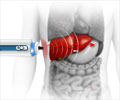DPP4 inhibitors are usually given for type 2 diabetes. These inhibitors not only improve the sugar metabolism, but can also treat non-alcoholic fatty liver disease.

‘DPP4 enzyme produced in the liver promotes obesity, non-alcoholic fatty liver disease, and insulin resistance.’





The research team led by Schürmann published its findings in Molecular Metabolism. These were the findings of a current study by DZD-researchers in Potsdam and Tübingen. //"DPP4 inhibitors are well known from the treatment of diabetes. Therefore, in our opinion, they could be used in the future not only to improve the sugar metabolism but also to treat non-alcoholic fatty liver disease," adds the lead author of the study, Christian Baumeier from DIfE.
DPP4 is an enzyme that, to a large extent, is produced by the liver and inhibits the effects of important intestinal hormones that are involved in blood glucose metabolism.
In addition, patients suffering from non-alcoholic fatty liver disease have elevated DPP4 levels in their blood. To date, however, it was unclear whether elevated levels of DPP4 in fatty livers are the cause or consequence of the disease.
In order to find an answer to this question, scientists working with Schürmann and Baumeier compared two different groups of mice with each other. While one group of mice produced an increased amount of DPP4 in the liver due to a genetic modification, the control group showed low amounts of the enzyme.
Advertisement
Additional studies on a human liver cell line as well as on isolated liver cells of the mice also indicated that normal amounts of DPP4 (500ng/ml) are already sufficient to make the cells less sensitive to insulin regardless of their fat content.
Advertisement
"From other studies we know that epigenetic modifications of the DPP4 gene, which are associated with an increased production of the enzyme, have a negative impact on the liver metabolism already in young mice, long before fatty liver disease emerges," says Baumeier. "It therefore seems reasonable to examine in further studies how and at what time DPP4 inhibitors can be used to prevent or to treat the development of a non-alcoholic fatty liver," added Schürmann, who heads the Department of Experimental Diabetology at the DIfE.
Source-Eurekalert














